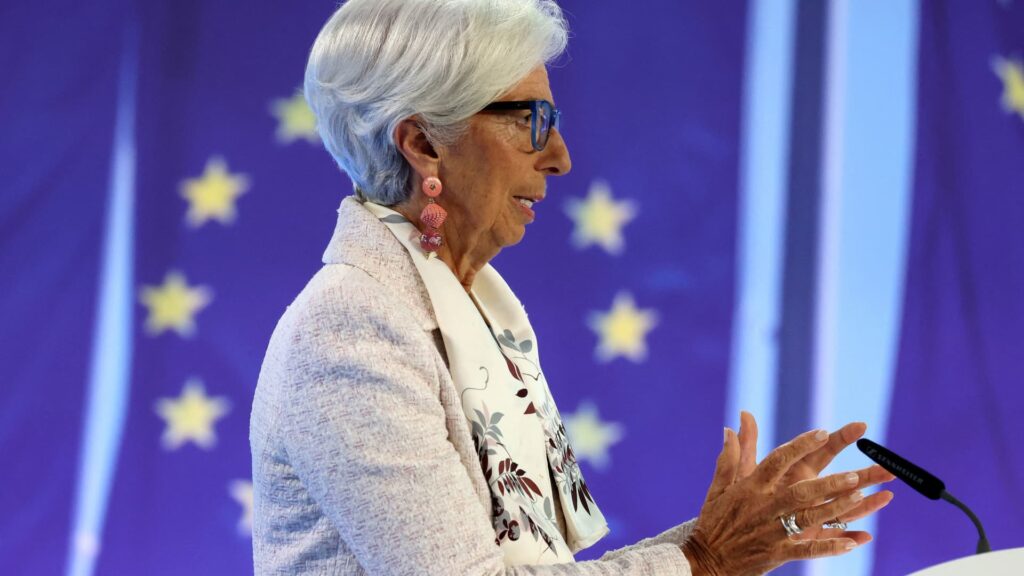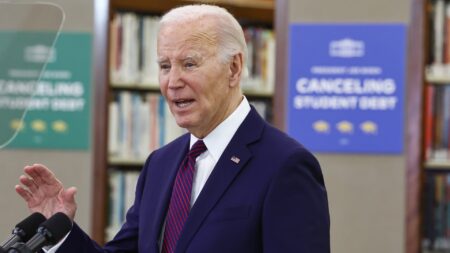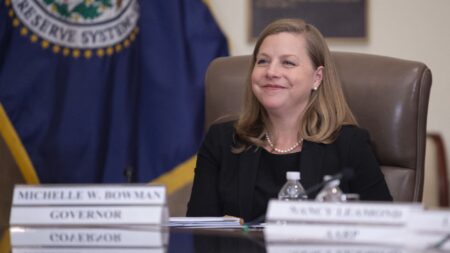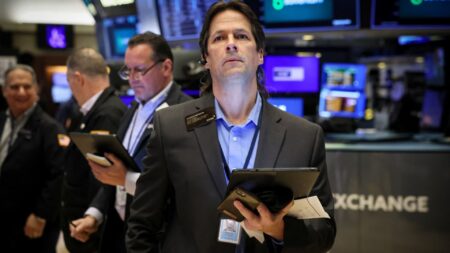President of the European Central Bank (ECB) Christine Lagarde gestures as she addresses a press conference following the meeting of the governing council of the ECB in Frankfurt am Main, western Germany, on July 27, 2023.
Daniel Roland | Afp | Getty Images
The European Central Bank on Thursday announced a 10th consecutive hike in its main interest rate, as the fight against inflation took precedence over a weakening economy.
Rate rises have now hauled the central bank’s main deposit facility from -0.5% in June 2022 to a record 4%. A key reason for the hike Thursday appeared to be upward revisions in newly published staff macroeconomic projections for the euro area, which see inflation averaging at 5.6% this year from a prior forecast of 5.4%, and 3.2% next year from a previous forecast of 3%.
However, it nudged its closely watched medium-term forecast lower, from 2.2% to 2.1%.
In a market-moving statement, it also indicated that further hikes may be off the table for now.
“Based on its current assessment, the Governing Council considers that the key ECB interest rates have reached levels that, maintained for a sufficiently long duration, will make a substantial contribution to the timely return of inflation to the target,” it said.
“The Governing Council’s future decisions will ensure that the key ECB interest rates will be set at sufficiently restrictive levels for as long as necessary.”
The euro fell sharply on the announcement and was down 0.5% against the U.S. dollar at $1.0686 at 3 p.m. Frankfurt, Germany, time, trading at a three-month low.
European stocks rallied following cautious trading through the morning, meanwhile, with the benchmark Stoxx 600 index up by 1.1%.
The ECB move on Thursday also takes the interest rates on its main refinancing operations and marginal lending facility 25 basis points higher, to 4.5% and 4.75%, respectively.
Staff also lowered economic growth projections for the euro area from 0.9% to 0.7% expansion in 2023, from 1.5% to 1% in 2024, and from 1.6% to 1.5% in 2025.
While the ECB has firmly signaled its next moves in previous meetings, economists and analysts were divided over whether the doves or hawks in Frankfurt would win out at this September’s meeting. Money markets indicated a roughly 63% chance of a hike through Thursday morning, up from a more even split in recent days.
Oil market reports suggesting tighter supply and higher prices through the rest of the year and beyond have fueled inflation fears, along with signs of wage growth. A Reuters article on Wednesday reporting the ECB now expects euro zone inflation to remain above 3% in 2024 appeared to increase market bets on a rate hike. The report came from a source ahead of the release of its projection Thursday.
“Some [Governing Council] members did not draw the same conclusion, and some governors would have preferred to pause and reserve future decisions once more certainty, more intelligence, would have resulted from the passing of time and the impact of our many previous decisions,” ECB President Christine Lagarde told CNBC’s Annette Weisbach in the news conference following the announcement.
“But I can tell you there was a solid majority of the governors to agree with the decision we have made.”
Lagarde said there was no concrete answer to whether rate hikes were finished since the Governing Council remains data dependent — but she stressed the ECB’s current thinking was encapsulated in the statement around rates at current levels making a “substantial contribution” to the fight against inflation if held for long enough.
Germany slump
Headline consumer price inflation in the bloc was 5.3% in August, the same level as core inflation, which strips out food and energy costs.
Europe’s biggest economy has shown continued deterioration, with business sentiment plummeting and services now declining along with manufacturing.
Germany is forecast to be the only major European economy to contract this year — though the wider picture is also downbeat, with euro zone business activity declining in August to its lowest level since November 2020.
Peter Schaffrik, chief European macro strategist at RBC Capital Markets, told CNBC that market focus would not so much be on the hike itself, but rather the language used by the central bank in its statement.
Schaffrik said one focus will be on the 2025 inflation forecast, which unlike forecasts for 2023 and 2024 was revised lower since this is typically what the ECB means when it talks about the medium term.
Another will be on its descriptor of rates being maintained for a “sufficiently long duration” — indicating the “path forward is flat for quite some time,” he said.
Read the full article here











